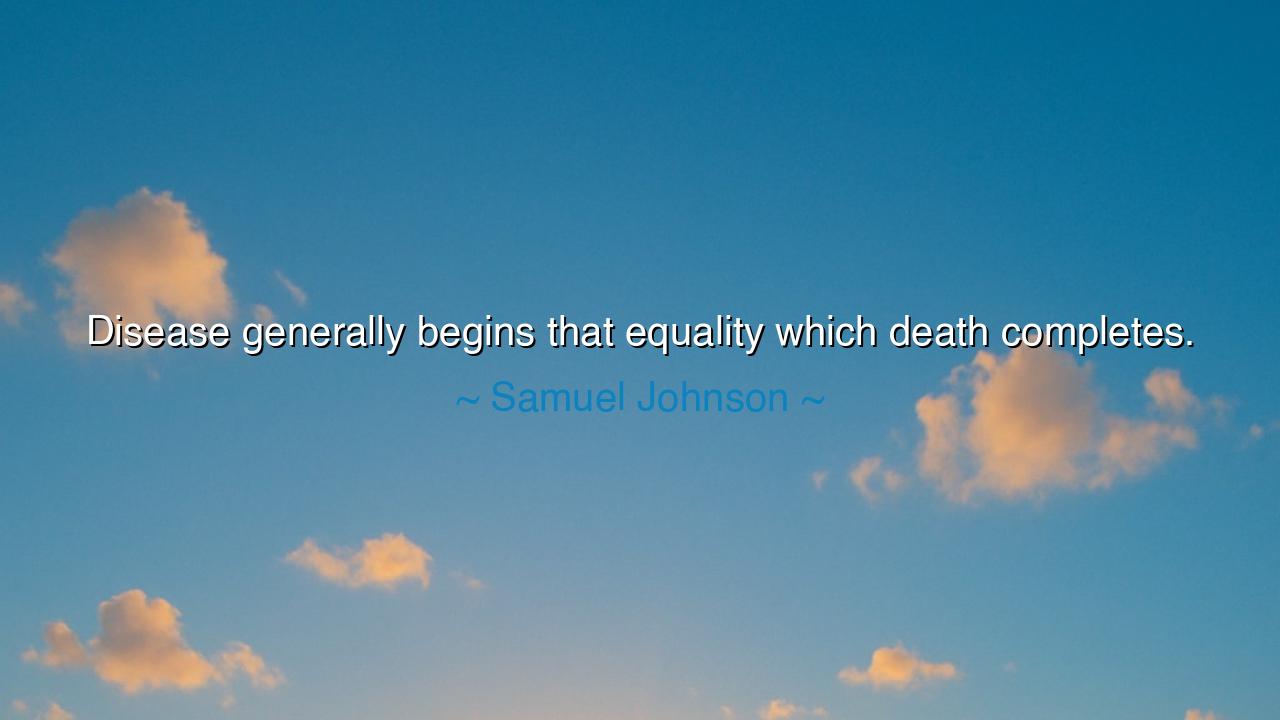
Disease generally begins that equality which death completes.






The words of Samuel Johnson — “Disease generally begins that equality which death completes.” — flow like a quiet toll of a funeral bell across the centuries, calling humanity to humility and reflection. In this brief yet profound thought, Johnson reminds us that mortality is the great equalizer, stripping away the illusions of wealth, power, and pride that divide humankind. The philosopher’s pen becomes a mirror to our vanity, showing that in sickness and in death, all men are brought low to the same dust. For disease, in its merciless reach, cares nothing for crowns or rags; it begins the leveling that death will finish.
Samuel Johnson, the English moralist, essayist, and lexicographer of the eighteenth century, was no stranger to suffering. His own body bore the marks of frailty — plagued from youth by scrofula, trembling fits, and melancholy. He understood better than most that the flesh, however adorned by fortune or fame, is but a fragile vessel. His mind, vast and learned, gazed upon the human condition with both tenderness and severity. In this quote, drawn from his meditations on mortality, Johnson captures a truth that transcends time: disease humbles the mighty before the same laws that bind the meek. Before pain and decay, there is no nobleman, no peasant, no scholar, no fool — only the human being, frail and finite, awaiting the inevitable hand of death.
The meaning of Johnson’s words lies in their recognition of both tragedy and wisdom. Disease is not merely the destruction of health; it is the messenger of truth, reminding the living that all worldly distinctions are temporary. The rich may dine from silver plates and the poor from clay, but when fever strikes, both tremble alike. The strong may command nations, but when the body weakens, even the conqueror must bow before the unseen. Johnson’s insight pierces the illusion of permanence. In the shadow of disease, pride dissolves, and equality — which men so often fail to achieve in life — begins to take shape in the realm of mortality.
The ancients, too, knew this truth. During the Plague of Athens, as Thucydides recorded, the pestilence swept through the city like fire, sparing neither the powerful nor the lowly. The temples overflowed with the dying, and wealth offered no refuge from the breath of death. Kings and servants, scholars and soldiers, all lay side by side in the dust. In that hour, all pretenses vanished; the philosopher was no greater than the slave. Disease had begun the work that death would soon complete — the leveling of mankind before the eternal. What remained, when status and possession were stripped away, was only the bare soul — naked before the judgment of the divine.
Yet there is more than sorrow in Johnson’s reflection. There is also mercy, and perhaps even hope. For if disease and death erase the divisions of men, then they also reveal the common thread of humanity that binds us all. When we are reminded of our fragility, we are called to compassion, to see in the suffering of others the mirror of our own fate. In this way, disease — the humbler of all — teaches charity. The noble heart learns to comfort, the proud learn to serve, and the selfish learn to love. Johnson’s words, though steeped in solemnity, carry the quiet wisdom that suffering can purify the soul and prepare it for higher understanding.
Consider the story of Emperor Marcus Aurelius, ruler of Rome and philosopher of the Stoics. During the plague that ravaged his empire, he did not flee to safety nor isolate himself in luxury. Instead, he stayed among his people, tending to the sick, leading by example, and reflecting upon mortality in his Meditations. “All that is born must die,” he wrote, “and all that dies returns to the earth.” He, the most powerful man in the known world, understood that death would make him no greater than the beggar in the street. And so he lived not in fear of equality, but in reverence of it. His reign became a testament to Johnson’s truth — that disease and death are not curses alone, but teachers that remind the living to walk humbly.
Thus, the lesson of Johnson’s quote is one of humility and empathy. Do not be deceived by the fleeting honors of life, nor measure others by what they possess or appear to be. The body is but dust on loan; time and sickness will reclaim it. Instead, cultivate the treasures that neither disease nor death can touch — kindness, integrity, and love. When you see another in weakness, remember that you too are mortal; when you stand in strength, remember that strength itself is borrowed. The wise do not wait for sickness to teach them compassion — they live in its truth every day.
So, my children, heed the wisdom of Samuel Johnson. Disease begins the equality that death completes, and this equality is not a curse, but a revelation. It tells us that beneath our differences, we share the same destiny, and therefore must walk the earth as brothers and sisters, not rivals. Let this knowledge make you gentler, braver, and wiser. Serve the suffering, forgive the erring, and cherish each fleeting breath. For when death at last completes its work, only the soul’s virtue shall remain — equal, unblemished, and eternal.






AAdministratorAdministrator
Welcome, honored guests. Please leave a comment, we will respond soon